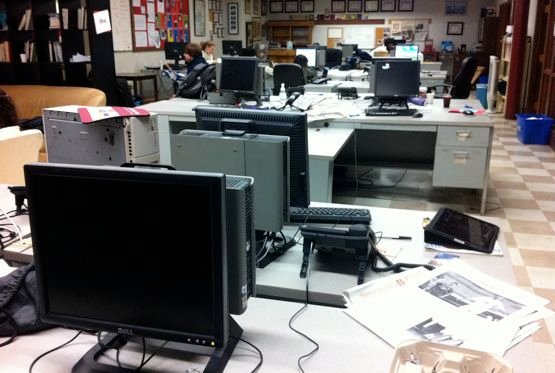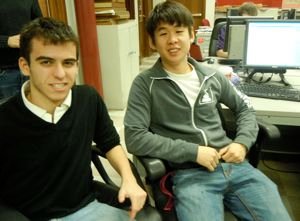Forty years ago I comped for The Harvard Crimson‘s News Board and became a Staff Writer. Tonight I was back at 14 Plympton Street, helping out as an SNE, which stands for Senior Night Editor or maybe Story Night Editor. Either way, it’s pronounced “snee,” rhymes with “knee,” and the job was to work with undergrads now comping for positions on the paper, which has been published daily at Harvard since 1873. Is “comp” a verb anywhere except at The Crimson? I don’t recall, and maybe I never knew.
My turn as a SNE came in response to a request emailed early in October by The Crimson’s current editor, Peter Zhu. He wrote the following:
“It’s almost time for the annual Turkey Shoot! I’m writing to ask if any alumni in the Cambridge area would be available and willing to come to 14P during the final week of interviews to help edit stories and proof the paper. We will need people to help out each night from Sunday, November 14 through Thursday, November 18. It’ll be of great help to all of us, and younger Crimeds will certainly love to meet you all and hear about your Crimson experiences as well. If you’re interested, please reply to me and Managing Editor Esther Yi (cc’d) as soon as possible.”
How could I resist? So I signed up just before we left for Africa and have been looking forward to tonight ever since, wondering what it would be like to walk back into the brick building that houses the paper, four decades after I was a sophomore trying out for the paper. Would I even know how to help edit a story so many years after my last job as a newspaperman, in Casper, Wyoming, circa 1982?
The Turkey Shoot, by the way, is not a matter of fowl play. It’s when the editors select their successors, as I remember. So those normally doing the night editing were huddled upstairs in The Sanctum, and they’ll be there till well past midnight, interviewing candidates to run the paper. When I reported for duty tonight, a much more recent alum, Stephanie Garlow, Class of 2008, explained that I would be working on several stories, helping the writers get them into final shape. Her job–and she’ll be at it until about 2 a.m.–is that of The Proofer. This means more than copyediting and proofing. She had a sheet of all the stories coming in, and who was writing them, and optimistic deadlines. She was like the conductor for the evening.
My first SNE session was with Joshua Lipson and Kevin Sun, both members of the Class of 2014. Joshua is comping for the Editorial Board, and Kevin is comping for the magazine, named FM, which didn’t exist 40 years ago. They had interviewed students and gathered pithy quotes about a new, nonbinding system to help the university get a look at likely class choices by students for the spring semester, well in advance of when class choices actually have to be made. I made a couple of suggestions, including the addition of “nonbinding” as a descriptor of the system, and they were accepted graciously by the writers. When we were done, we saved the copy in a computer folder for Stephanie.
Next up was an obit, about which genre I know a thing or two from my days as a cub reporter for The Woonsocket (R.I.) Call, which I’m glad to see has a decent web site. Rachael Apfel ’14, comping for the News Board, had done a good job recounting the life and passing of a woman who had taught at the Harvard Medical School. The source material included a baffling scientific term which Rachael and I puzzled over, consulting Wikipedia and Google for help in giving it a reference that would help ordinary readers understand which area of medicine the deceased had done significant work in. I’m not sure how a night editor 40 years ago would have handled the question. I don’t remember any medical dictionaries lying about 14 Plympton Street, but I know one of the editors who worked with my very rough copy would have insisted that an inexplicable term be somehow decoded.
My last session reminded me of the difficulty I always had getting good quotes for stories when I was a reporter. I learned a kind of shorthand, which I found in a book, but sometimes I couldn’t decipher it, and people always had a way of talking faster than my scribbling. So I’d have partial quotes, and I’d have quotes with … in the middle of them. These are unlovely to read, so it’s a matter of using indirect quotes that are accurate if not in the exact words, mixed with direct quotes, and having the whole thing flow. Hana Rouse ’14, comping for the News Board, had attended a session for Harvard Law Students on the topic of being gay in the legal workplace. What’s different now compared with 10 or 15 years ago–nevermind 40? Students attending the session heard useful advice from lawyers who are openly gay and not finding discrimination to be a serious barrier to success at their progressive firms. Hana and I spent about a half hour working from her carefully written notes in a notebook, piecing the story together in a way that I think we both liked by the time we were finished.
It took some restraint for me not to recommend that Hana ask someone to give her a Livescribe Echo pen for her next birthday, because that amazing invention is a reporter’s dream. If she had taken her notes today with the smartpen, she would have been able to touch the notebook at any given place and heard the exact words of the speaker. I learned about Livescribe from a journalistic hero of mine who was president of The Crimson in my era, James Fallows, national correspondent for The Atlantic, who called the smartpen his new favorite gadget way back in July, 2009.
While I was waiting for stories to work on, I eavesdropped on animated discussions taking place in the newsroom. One story possibility generated a scrum of about five people in a circle, poking at shards of information to see if they could be arranged into a solid news piece. One girl had off-the-record information from her roommate that seemed to indicate one line of approach. An editor who had stepped out of the Turkey Shoot listened wisely, asking pertinent questions of the younger writers. It had something to do with the student Republicans, I believe, so I’ll be curious to see if it makes tomorrow’s paper or if it was spiked for lack of facts.
Words matter in a newsroom. That’s what I loved about the newspapers where I worked. The struggle to understand what’s really happening and to put it into clear words was evident tonight at 14 Plympton Street, and I found it invigorating. Old Media may well be giving way to Something New. But I hope there will always be smart people willing to work as journalists. I take it as a positive sign that The Crimson’s newsroom was filled tonight with such talent and energy. Most of those students will be there till the wee hours, doing their best to get it right.
Note: Amazingly enough, I was able to find this list of 16 articles that I wrote for The Crimson nearly 40 years ago. Too bad the smartpen had not been invented yet!




